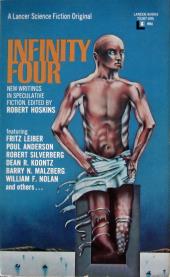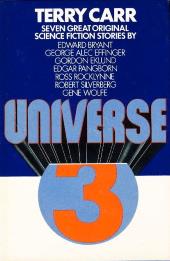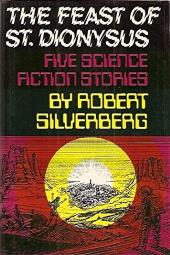Novella
Jacques Chambon
translator
- Filter: Show all works, including those with no time phenomena.
- Found: 6 results in 3.44ms
Short Story
What We Learned from This Morning’s Newspaper
- by Robert Silverberg
- in Infinity Four, edited by Robert Hoskins (Lancer Books, November 1972)
When all eleven families on Redford Crescent receive a newspaper from the middle of next week, the result is a hastily called neighborhood meeting and an assortment of get-rich-quick plans. —Michael Main
Which sounds more fantastic? That someone would take the trouble of composing an entire fictional edition of the Times setting it in type printing it and having it delivered or that through some sort of fluke of the fourth dimension we’ve been allowed a peek at next week’s newspaper?

Novelette
Many Mansions
- by Robert Silverberg
- in Universe 3, edited by Terry Carr (Random House, October 1973)
With eleven years of marriage behind them, Ted and Alice’s fantasies frequently start with a time machine and end with killing one or another of their spouse’s ancestors before they can procreate. So naturally, they each end up at Temponautics, Ltd. Oh, and Ted’s grandpa has some racy fantasies of his own.
In Silverberg’s Something Wild Is Loose (Vol. 3 of his collected stories), he posits that this story is “probably the most complex short story of temporal confusion” since Heinlein’s “By His Bootstraps” (1941) or “—All You Zombues—” (1959), but I would respectfully disagree. In particular, I would describe Heinlein’s two stories as the most complex short stories of temporal consistency in that there is but a single, static timeline and (in hindsight) every scene locks neatly into place within this one timeline. By contrast, Silverberg story involves multiple time travel choices by the characters in what I would call parallel universes. The confusion, such as it is, stems more from what appears to be alternate scenes in disconnected universes rather than temporal confusion per se. —Michael Main
In Silverberg’s Something Wild Is Loose (Vol. 3 of his collected stories), he posits that this story is “probably the most complex short story of temporal confusion” since Heinlein’s “By His Bootstraps” (1941) or “—All You Zombues—” (1959), but I would respectfully disagree. In particular, I would describe Heinlein’s two stories as the most complex short stories of temporal consistency in that there is but a single, static timeline and (in hindsight) every scene locks neatly into place within this one timeline. By contrast, Silverberg story involves multiple time travel choices by the characters in what I would call parallel universes. The confusion, such as it is, stems more from what appears to be alternate scenes in disconnected universes rather than temporal confusion per se. —Michael Main
On the fourth page Alice finds a clause warning the prospective renter that the company cannot be held liable for any consequences of actions by the renter which wantonly or wilfully interfere with the already determined course of history. She translates that for herself: If you kill your husband’s grandfather, don’t blame us if you get in trouble.

Novelette
Trips
- by Robert Silverberg
- in The Feast of St. Dionysus (Charles Scribner’s Sons, March 1975)
Silverberg’s introduction to “Trip” in the collection Trips, vol. 4 of the Collected Stories of Robert Silverberg (Subterranean Press, 2009), states that he wrote the story with the goal of being the ultimate alternative universes story, and he lived up to that goal, devising nearly a dozen alternative Bay Area universes for his hero Cameron to express his wanderlust. Admittedly, there’s no actual time travel because the story was part of an anthology of ultimate sf, and Silverberg left the time travelin’ to Philip K. Dick’s “A Little Something for Us Tempunauts.” But there is a world that Cameron thinks is a 1950s San Francisco (it isn’t) and there’s a chance that Cameron experiences the passage of time at rates that differ from world to world.
Warning: The first publication of the story in that ultimate anthology (Final Stage: The Ultimate Science Fiction Anthology) was “cut to shreds” by a ham-handed editor at Charterhouse, so your best bet is to read it in one of Silverberg’s later collections. —Michael Main
Warning: The first publication of the story in that ultimate anthology (Final Stage: The Ultimate Science Fiction Anthology) was “cut to shreds” by a ham-handed editor at Charterhouse, so your best bet is to read it in one of Silverberg’s later collections. —Michael Main
There’s an infinity of worlds, Elizabeth, side by side, worlds in which all possible variations of every possible event take place. Worlds in which you and I are happily married, in which you and I have been married and divorced, in which you and I don’t exist, in which you exist and I don’t, in which we meet and loathe one another, in which—in which—do you see, Elizabeth, there's a world for everything, and I’ve been traveling from world to world.

Short Story
The Toynbee Convector
- by Ray Bradbury
- Playboy,January 1984
You’ll enjoy this story, but I’ll give away no more beyond the quote below. By the way, if you get the original publication, you’ll also see Kurt Vonnegut and Marilyn Monroe. —Michael Main
What can I do to save us from ourselves? How to save my friends, my city, my state, my country, the entire world from this obsession with doom? Well, it was in my library late one night that my hand, searching along shelves, touched at last on an old and beloved book by H. G. Wells. His time device called, ghostlike, down the years. I heard! I understood. I truly listened. Then I blueprinted. I built. I traveled [. . .]

Novella





